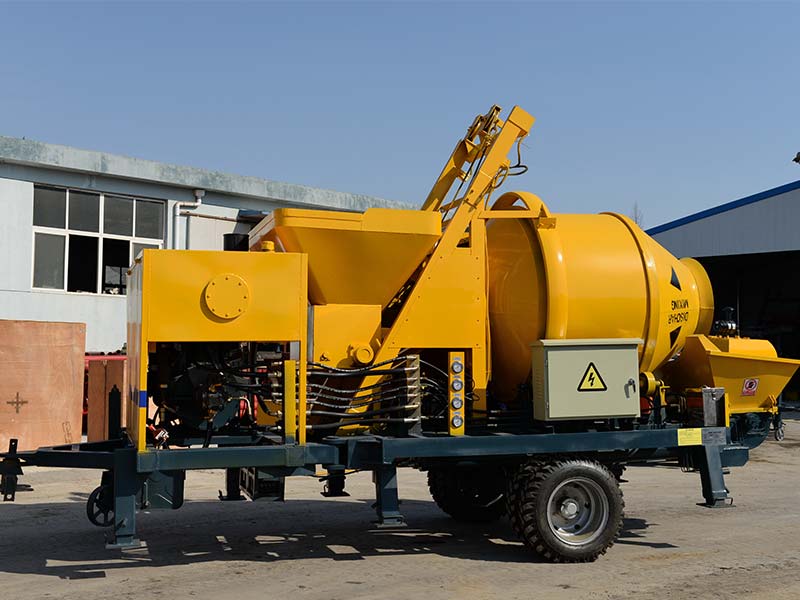Concrete Pump vs. Concrete Mixer
In the realm of construction, the terms "concrete pump" and "concrete mixer" are often used interchangeably, leading to confusion among those less familiar with the intricacies of the industry. However, these are distinct pieces of equipment with unique functions that play crucial roles in the concrete construction process. In this comprehensive guide, we aim to elucidate the key differences between a Concrete Pump and a Concrete Mixer.
Concrete Pump: Precision in Placement
Overview
A Concrete Pump is a specialized machine designed to efficiently transport liquid concrete from the mixer to the construction site. It's a remarkable piece of engineering that enhances the precision and speed of concrete placement.
Functionality
The primary function of a concrete pump is to deliver concrete to precise locations, whether it be vertically or horizontally. Utilizing a system of hoses and pipes, a concrete pump ensures that the concrete reaches even the most challenging and intricate spaces, providing a level of accuracy that is unmatched.

Types of Concrete Pumps
Boom Pumps
Boom pumps are equipped with a remote-controlled articulating robotic arm, allowing for a wide range of motion and flexibility in placing concrete in high or hard-to-reach areas. This makes them indispensable for tall buildings or expansive construction projects.
Line Pumps
Line pumps, on the other hand, are more suitable for smaller construction sites. They are versatile, offering the ability to pump concrete both horizontally and vertically, making them ideal for projects with varying requirements.
Advantages
Concrete pumps offer several advantages, including increased efficiency, reduced labor requirements, and enhanced accuracy in concrete placement. They are particularly beneficial for large-scale projects where time and precision are critical factors.
Concrete Mixer: The Heart of Concrete Production
Overview
While a concrete pump focuses on transportation and placement, a Concrete Mixer is the heart of the concrete production process. It is where the raw materials, including cement, aggregates, and water, are combined to create the concrete mixture.
Functionality
A concrete mixer operates by rotating a drum, ensuring a thorough and consistent blending of the ingredients. This results in a homogeneous mixture ready for transportation to the construction site via a concrete pump.
Types of Concrete Mixers
Drum Mixers
Drum mixers are the most common type, with a rotating drum that mixes the components. They are widely used for both small and large-scale construction projects.
Twin-Shaft Mixers
Twin-shaft mixers are known for their high-intensity mixing, producing a more uniform and faster concrete mix. They are preferred for projects requiring a higher level of precision.
Advantages
Concrete mixers offer efficiency in the production process, ensuring a consistent quality of the concrete mixture. The ability to control the mix proportions precisely makes them indispensable in achieving the desired strength and durability of the final product.
Choosing the Right Equipment for the Job
When embarking on a construction project, it's crucial to understand the specific requirements and choose the appropriate equipment. While both concrete pumps and mixers play pivotal roles, their functions are complementary, and a harmonious collaboration between the two ensures the seamless execution of construction tasks.
Factors Influencing the Choice
Project Size
For large-scale projects, where efficiency and precision are paramount, a combination of a concrete mixer pump is often the most practical choice. This synergy ensures a continuous flow of concrete, minimizing downtime and expediting the construction timeline.
Accessibility
Consideration of the construction site's accessibility is crucial. Boom pumps are ideal for projects with challenging access points, while line pumps and smaller mixers may be more suitable for confined spaces.
Construction Design
The intricacies of the construction design also dictate the choice between a concrete pump and mixer. Tall structures may necessitate the use of boom pumps, while simpler projects may only require the efficiency of a reliable concrete mixer.
Conclusion
In summary, understanding the fundamental differences between a concrete pump and a concrete mixer is paramount for anyone involved in the construction industry. Each serves a unique purpose, contributing to the seamless execution of construction projects.
评论
发表评论